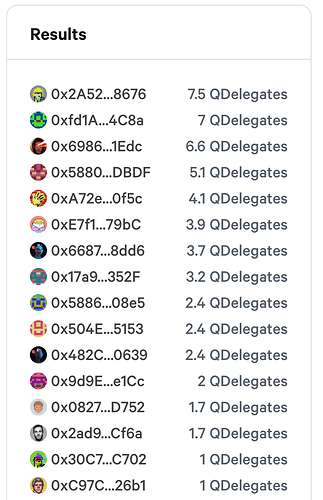HIP: 63
title: Quadratic Delegations on the DAO Snapshot
author: berty.eth, avilches.eth, drlorente97.eth, @L18630, ludoviko.eth, santi.eth, v4len.eth
status: Phase-2
created: 2022-09-10
Simple Summary
This HIP proposes the DAO decides implementes Quadratic Delegations on its Snapshot page for making decisions.
Abstract
Due to recent events that led to the DAO Mission Board to recommend the suspension of delegations, we have put forward this proposal in order to allow the DAO to implement a mechanism of Quadratic Delegations that will help prevent clientelism and vote gerrymandering.
Motivation
Delegations have been subject of controversy since they potentially allow clientelism and ultimately create a dynamic where a handful of whales end up making the decisions on behalf of the community.
At the same time, delegations can happen naturally on cyberspace whether Snapshot allows it or not, with applications that can replicate automatically the vote of a person. This is why it is often considered UX to make these easily available in the User Interface so everyone can play with the same rules.
Specification
We propose a new alternative regarding delegations.
- Quadratic Delegations: People are free to delegate their vote, but delegations get tallied quadratically. This means that the square root of the delegations received is counted rather than the full amount of delegations.
This model brings the following advantages to the governance dynamics of the DAO:
- Mitigates gerrymandering attacks by limiting the influence of a delegate
- Mitigates clientelist attacks by limiting the influence of a delegate
- Incentivizes voters to delegate to those with fewer delegations rather than large whales
- Incentivizes that voters prioritize using direct vote to override delegate vote.
- Incentivize groups of delegates to organize collectiviely rather than seek individual power.
- Values the creation of an ecosystem of multiple minorities rather than bipartidism.
Implementation
To implement Quadratic Delegations, the math module must be implemented on Snapshot in replacement of erc20-balance-of-delegation using the following script:
{
"symbol": "QDelegates",
"operands": [
{
"type": "strategy",
"strategy": {
"network": "1",
"name": "erc20-balance-of-delegation",
"params": {
"symbol": "VOTE",
"address": "0x1dAD862095d40d43c2109370121cf087632874dB",
"decimals": 0
}
}
}
],
"operation": "square-root"
}
A test implemetation of Quadratic Delegations can be found on this Snapshot poll.
Additonal notes.
Glen Weyl, author of the original paper on Quadratic Voting and the book “Radical Markets” has pronounced himself in favor of the idea on Twitter.
Phase-3 Poll: Snapshot
